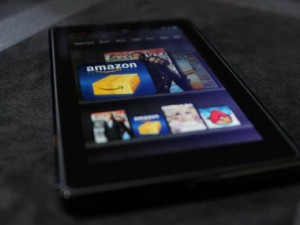No matter if Amazon’s Kindle Fire becomes the hottest product since the iPad 2, it’s already giving Apple a run for its money in the tech rumourmill. One of the juiciest rumours so far has been that Amazon may be in talks to buy HP’s mobile and tablet operating sytem, WebOS. The story surfaced on Friday from well regarded tech blog, VentureBeat. Devindra Hardawar wrote:
“A well-placed source tells us that HP is currently looking to rid itself of Palm as soon as possible, and that Amazon is the closest to finalizing the deal, among a handful of contenders.”
[caption id=“attachment_95201” align=“alignleft” width=“300” caption=“The new Kindle by Amazon. AFP”]  [/caption] HP wouldn’t comment, and Amazon couldn’t be reached for a comment. At least Hardawar gave both companies an opportunity to debunk the rumour, but neither took the bait. The report set tech journalists and bloggers buzzing, but most asked: Why would Amazon want its own mobile OS after it just launched a tablet, the Fire, this week based on Google’s Android? Charles Knight, posted this comment on the VentureBeat post, and it nicely sums up the questions surrounding this rumour:
“1) Build Android based app store 2) Build cloud apps based around android 3) Fork android and build tablet 4) Spend time and money developing a new GUI to go over the top of your forked branch 5) Have a massive release of new tablet, order around eight million 6) Buy webOS – huh?”
Apart from the “well-placed source”, there is some circumstantial evidence to support the rumour. HP’s Jon Rubenstein joined the board of Amazon late in 2010. Rubenstein briefly headed up Palm before it was bought by HP and he came to the mobile phone manufacturer from Apple, where he was head of hardware engineering. When HP was considering licencing WebOS to other companies, Rubenstein mentioned HP specifically in an interview with site “This is my Next” in July.
“There’s a variety of different sets of a characteristics to qualify as a good partner. I would say Amazon would certainly make a great partner, because they have a lot of characteristics that would help them expand the webOS ecosystem. As to whether there’s been discussions or not… that’s obviously not something I’m going to comment about.”
Ingrid Lunden at paidContent rationalised Amazon’s interest in that the company might want to create a range of WebOS driven devices such as a Kindle phone or even a Kindle PC. Of course, with the patent wars in mobile escalating and no clear end in sight, companies are scrambling to buy protection. But would buying WebOS give them any extra protection? Writing on the New York Times DealBook, Evelyn Rusli looked at whether buying ammunition for the patent wars, “a war of war of intergalactic proportions”, might explain possible interest in WebOS by Amazon:
“Palm, with its trove of patents related to mobile software and devices, could help Amazon stave off future litigation, from competitors like Apple, or Microsoft.”
Another explanation is that Amazon doesn’t want the code for WebOS, it just wants the staff and expertise. Yet tech journalists remained unconvinced. My former Guardian colleague Jack Schofield was deeply sceptical. Amazon had already put significant work creating its own touch interface for the Fire, to differentiate it from the growing ranks of Android-driven tablets. Jack added:
“For Amazon to put that same differentiation on top of a failed operating system (WebOS) instead of on top of a successful one makes no sense.”
Impact Shorts
More ShortsHe also said that rather than creating an entirely new eco-system of devices based on WebOS was certainly a rather long way to get to get to the “next billion cusmers”. Could rumours hurt the Fire? All of this still begs the question: Why would Amazon put all of this effort into customising the Android operating system and interface for the Fire only to then shift strategy so soon after launch? Sewing such confusion amongst consumers, or leading them to believe that something faster, better or just cheaper is right around the corner, is a surefire way to lose sales. Even before the rumour started that Amazon might buy WebOS, Ryan Block of the gdgt blog said that a second-gen Fire is already on its way:
“Well, this delay to get the “stopgap” Kindle tablet out in time for the holiday season this year may have pretty serious consequences for early adopters and holiday shoppers: my sources tell me the second-gen Kindle tablet (or Kindle Fire, as it’s now been dubbed) will be out in Q1 of 2012 – yes, that soon.”
If I were a conspiracy theorist, I might suggest that someone is spreading rumours about Amazon’s tablets and tablet strategy to damage sales, and it’s having at least some success: Amazon’s stock dropped on Friday because of the rumours. The company’s PR department better step up its game or all this speculation could douse some of the excitement surrounding the Fire.


)

)
)
)
)
)
)
)
)



